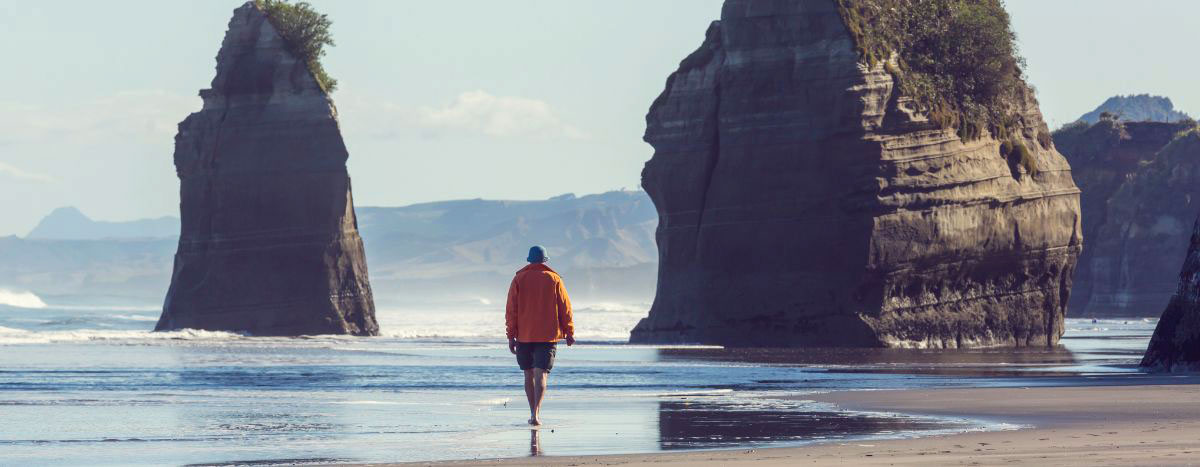New Zealand experienced its warmest year on record in 2021, and extreme weather events like flooding, drought and bushfires are predicted to increase in most areas of the country1.
These changes in climate are due to global warming, which is linked to the overproduction of greenhouse gases. These gases function similarly to a blanket around Earth, trapping warmth from the sun2. While these gases make life possible on Earth, too much of them in the atmosphere raises the average temperature around the planet. And even a mere 1.5-degree change can lead to disastrous circumstances – melting glaciers, shrinking water supplies, damaged ecosystems, and more3.
The devastating impacts of climate change
Climate change has hit New Zealand hard and continues to do so.
One of the biggest issues that threatens New Zealanders is coastal erosion. The increase in global temperature melts glaciers and ice sheets, causing sea levels to rise4. The expansion in ocean water accelerates coastal erosion, eating into habitable land near coasts and cliffs.
A report by the Deep South Challenge5 noted that New Zealand had a small tidal range compared to the rest of the world, which means a slight rise in sea level could have particularly impactful effects. At the rate we are going, an estimated 10,230 properties are foreseen to be affected by coastal erosion by 2050.
The report also stated that Christchurch would be the worst affected by the rising tide, while Wellington would face the effects first.
Breaking down climate change
There has been a 52 per cent worldwide increase in carbon dioxide – a greenhouse gas – between 1990-2016, primarily due to fossil fuel burning6. And in New Zealand, there has been a staggering 19.6 per cent increase in greenhouse gas emissions since 19907.
New Zealand has two primary sources of greenhouse gas emissions – energy use and agriculture8.
Energy-related emissions include transportation, manufacturing, construction and more. With the top emitter being light vehicles such as cars and vans.
Agriculture accounts for almost half of New Zealand’s total greenhouse gas emissions, which the Ministry for Primary Industries describes as “unusual for a developed country”9.
How we can make a difference
Our health is deeply intertwined with the environment. According to AIA’s 5590+ report, our interactions with the planet are a factor that can lead to five non-communicable diseases, which cause 90 per cent of deaths in New Zealand.
While the Government is aiming to reach net-zero greenhouse gases (excluding biogenic methane) by 205010, we can each play our part to fight climate change from home. When we pitch in, we act as role models for our community, our tamariki, and eventually, future generations – and that can make all the difference.
There are plenty of simple and achievable ways to contribute to reducing our carbon footprint. Here are some ideas to get you started:
- Walk or ride or utilise public transport. If you must drive, park a little further away and walk the rest of the way. Every little bit counts.
- Choose to rely on renewable energy wherever possible. If you’re moving or building a new house, find out how you can tap into green energy – solar is a popular option and can save you money at the same time.
- Reduce your household’s meat and dairy consumption. It’s better for your health, and you’ll help reduce the demand for livestock farming.
- Choose to buy more energy efficient products and home appliances. They have a smaller carbon footprint and can save you extra money on your energy bill too.
- Grow a veggie garden, compost your food scraps or start a worm farm.
When we care for the planet, we benefit our health. There are plenty of ways we can lower our carbon footprint, and it’s important to remember that every little bit counts.
Footnotes:
- https://environment.govt.nz/assets/publications/Climate-Change-Projections-Guidance-FINAL.pdf
- https://www.eeca.govt.nz/insights/energys-role-in-climate-change/
- https://www.wwf.org.nz/what_we_do/climateaction/
- https://www.newshub.co.nz/home/new-zealand/2021/04/coastal-erosion-the-sea-level-rises-putting-thousands-of-new-zealand-homes-at-risk-and-how-the-govt-decides-who-foots-the-bill.html
- https://deepsouthchallenge.co.nz/resource/insurance-retreat-december-2020-final-report/
- https://niwa.co.nz/climate-and-weather/climate-change
- https://niwa.co.nz/climate-and-weather/climate-change
- https://www.stats.govt.nz/indicators/new-zealands-greenhouse-gas-emissions/
- https://www.mpi.govt.nz/funding-rural-support/environment-and-natural-resources/climate-change-primary-industries/#:~:text=Agriculture%20and%20livestock%20produce%20about,reducing%20our%20net%20emissions%20profile
- https://climateactiontracker.org/countries/new-zealand/#:~:text=New%20Zealand%20passed%20its%20Zero,reach%20net%20zero%20by%202050






